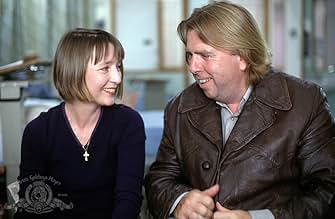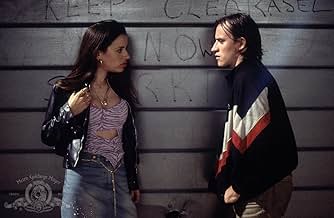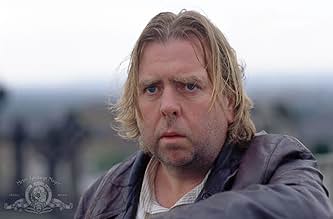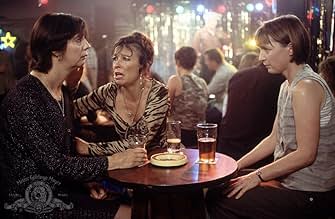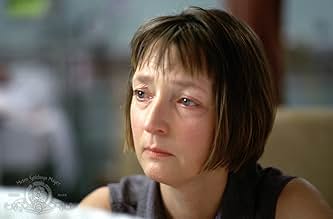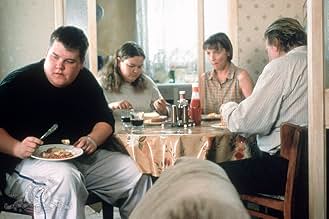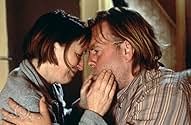CALIFICACIÓN DE IMDb
7.5/10
12 k
TU CALIFICACIÓN
En una casa de clase trabajadora de Londres, el amor de Penny por su socio, el taxista Phil, se ha agotado. Cuando ocurre una tragedia inesperada, ellos y su comunidad local se vuelven a uni... Leer todoEn una casa de clase trabajadora de Londres, el amor de Penny por su socio, el taxista Phil, se ha agotado. Cuando ocurre una tragedia inesperada, ellos y su comunidad local se vuelven a unir.En una casa de clase trabajadora de Londres, el amor de Penny por su socio, el taxista Phil, se ha agotado. Cuando ocurre una tragedia inesperada, ellos y su comunidad local se vuelven a unir.
- Dirección
- Guionista
- Elenco
- Premios
- 3 premios ganados y 13 nominaciones en total
- Dirección
- Guionista
- Todo el elenco y el equipo
- Producción, taquilla y más en IMDbPro
Opiniones destacadas
Lets be honest, Mike Leigh's films are not for everyone. No effort is made to make them commercially viable, the cast are almost always, largely unknown and certain scenes are so harrowing that even the strongest viewer can find themselves distressed and perturbed. While these factors keep some people away, they also keep many others coming back time and time again. Mike Leigh is quite simply, a national treasure. And I don't mean that in the same fluffy "Gawd Bless 'Em" manner that people applied to Thora Hird and the Queen Mother. I mean that he is simply one of the finest and most honest chroniclers of contemporary Britain that we have produced.
Make no mistake, the British have always enjoyed social realism. We can gauge that through that great yardstick of social self-perceptions, the soap opera. While the Americans produce soaps full of tanned, successful oil barons and their supermodel / actress mistresses, and the Australians show us their blue collar bungalow owners who like a beer with their mates and a barbecue on Sundays, the British make soaps full of characters who are little more than diluted, softened incarnations of Leigh's own subjects. People who work at checkouts and in launderettes, people who are trapped by poverty, alcoholism, violence and stifled or strangled ambition.
But through it all , there's a hope, an anticipation of a better day just around the corner and that's what makes these films ultimately uplifting. Leigh has always shown that no matter how dire the circumstances, how forlorn the existence, love and hope, friendship and family, will find a way to offer support, comfort and succor.
In achieving this, Leigh has the assistance of another of the U.K.'s finest - Timothy Spall. If ever an actor was capable of portraying at once the fragility, insecurity and yet the potential for sheer stubborn strength of the British psyche its Spall. His character in All or Nothing, Phil is an incredibly vulnerable man. A pensive, gentle man, trapped in his own doubts and in a world of people who react by lashing out, verbally or physically and so compounding his doubts and fear. He apologises constantly, and often appears to be apologising for simply existing. An under-educated but intellectual man he even apologises for having an extensive vocabulary, a character trait which Leigh uses cleverly but subtly by having Phil precede each "big word" with "wotsitsname". It appears that Phil is searching for the word, he isn't, he knows exactly what he's about to say but is reluctant to say it in case he appears educated or articulate. We hear Phil talk about destiny and saying "It's...wotsitsname..kismet". In a world of expletives and harsh words he's ashamed at his verbal dexterity viewing it as a weakness rather than a strength.
Devices such as these help us understand technically why Leigh is just such a good writer and the way in which these devices are performed help us understand why Leigh constantly looks to Spall to anchor his scripts with his marvelous humanity.
All or Nothing is a vicious, gut wrenching, graceful, uplifting gem of a movie from a master filmmaker. Its is performed by a marvelous leading man and a collection of wonderfully talented supporting actors. In a world of blockbusters and multi million dollar opening nights Mike Leigh continues to give us humanity, despair, courage and beauty. And do we ever need him.
Make no mistake, the British have always enjoyed social realism. We can gauge that through that great yardstick of social self-perceptions, the soap opera. While the Americans produce soaps full of tanned, successful oil barons and their supermodel / actress mistresses, and the Australians show us their blue collar bungalow owners who like a beer with their mates and a barbecue on Sundays, the British make soaps full of characters who are little more than diluted, softened incarnations of Leigh's own subjects. People who work at checkouts and in launderettes, people who are trapped by poverty, alcoholism, violence and stifled or strangled ambition.
But through it all , there's a hope, an anticipation of a better day just around the corner and that's what makes these films ultimately uplifting. Leigh has always shown that no matter how dire the circumstances, how forlorn the existence, love and hope, friendship and family, will find a way to offer support, comfort and succor.
In achieving this, Leigh has the assistance of another of the U.K.'s finest - Timothy Spall. If ever an actor was capable of portraying at once the fragility, insecurity and yet the potential for sheer stubborn strength of the British psyche its Spall. His character in All or Nothing, Phil is an incredibly vulnerable man. A pensive, gentle man, trapped in his own doubts and in a world of people who react by lashing out, verbally or physically and so compounding his doubts and fear. He apologises constantly, and often appears to be apologising for simply existing. An under-educated but intellectual man he even apologises for having an extensive vocabulary, a character trait which Leigh uses cleverly but subtly by having Phil precede each "big word" with "wotsitsname". It appears that Phil is searching for the word, he isn't, he knows exactly what he's about to say but is reluctant to say it in case he appears educated or articulate. We hear Phil talk about destiny and saying "It's...wotsitsname..kismet". In a world of expletives and harsh words he's ashamed at his verbal dexterity viewing it as a weakness rather than a strength.
Devices such as these help us understand technically why Leigh is just such a good writer and the way in which these devices are performed help us understand why Leigh constantly looks to Spall to anchor his scripts with his marvelous humanity.
All or Nothing is a vicious, gut wrenching, graceful, uplifting gem of a movie from a master filmmaker. Its is performed by a marvelous leading man and a collection of wonderfully talented supporting actors. In a world of blockbusters and multi million dollar opening nights Mike Leigh continues to give us humanity, despair, courage and beauty. And do we ever need him.
This film is worth a hundred others because it is not an exercise in making a product and marketing it successfully- instead it is a statement by a man who is a true director, someone who feels passionately about the world we live in, and uses this fantastic medium to its highest potential.
The film is ultimately about a man (Phil, Timothy Spall) who has philosophized about life to the point where nothing matters to him anymore. The only thing that brings him back around the world of the living is (the only thing any of us really need for happiness)... Love.
For me, that is one of the most pertinent and beautiful things that someone with a voice in society can say.
P.S. It is highly likely that if anyone found this film 'too depressing' than they are not really primed to expect anything other than the beauty and predictability of
hollywood film. And in response to the chap who refutes the existence of such misery in the real world: you are obviously a lucky, privileged chap.
The film is ultimately about a man (Phil, Timothy Spall) who has philosophized about life to the point where nothing matters to him anymore. The only thing that brings him back around the world of the living is (the only thing any of us really need for happiness)... Love.
For me, that is one of the most pertinent and beautiful things that someone with a voice in society can say.
P.S. It is highly likely that if anyone found this film 'too depressing' than they are not really primed to expect anything other than the beauty and predictability of
hollywood film. And in response to the chap who refutes the existence of such misery in the real world: you are obviously a lucky, privileged chap.
Phil (Timothy Spall) is an overweight taxi driver who gets up late in the day and works intermittently, barely communicating with his family except for a few grunts. His philosophy of life is expressed as "We're all born alone. We die alone. There's nothing we can do about it". Mike Leigh has given us powerful portrayals of the underclass in his previous films Naked, Secrets and Lies, and Life is Sweet but none more powerful and moving than his latest, All or Nothing.
In this film, Leigh looks at three families living in a dreary South London housing complex and captures their lives with an intimacy that is almost unbearable. All or Nothing has a documentary feel, almost as if the camera was just planted in the middle of the living room to observe. The conditions are familiar: unemployment and underemployment, alcoholism, teen pregnancy, isolation, and the inevitable loss of self-esteem and despair. It is, however, more than a drama of oppressive social conditions, but also of lack of communication between people who desperately need love but are too afraid or lethargic to ask for it.
Spall's performance is a revelation. His unshaven face, disheveled hair, and hangdog expression communicate deep resignation. The film is bleak but Leigh mixes its heartbreak with joy. When a neighbor Maureen (Ruth Sheen) sings ''Don't It Make My Brown Eyes Blue,'' at a karaoke bar, her eyes shine with a glow that seems at odds with the rest of her life but is so contagious that even her most dispirited friends take notice.
It is obvious, from the start that something is amiss. Phil says nothing when his obese son Rory (James Cordon) hurls words of abuse at his common-law wife Penny. Rory is an overweight bully who does nothing but lay around the house, watching TV and hurl insults at everyone in his path. Sister Rachel (Alison Garland) has a job cleaning up at a nursing home but also seems to be going through the motions of living except when she is interacting with patients. Penny works in a supermarket and does just about everything to keep the family going, but it never seems to be enough. The film's sub-plots add to the feeling of life reeling out of control, but none of these are fully developed and are just dropped without tying up the loose ends. Maureen's teenage daughter is pregnant by some lout that doesn't give two hoots about her. Another resident, unemployed Samantha (Sally Hawkins) hates her parents and finds herself seducing a very strange young man (Ben Crompton) lurking in the shadows of the complex grounds.
The second half of the film concentrates mainly on Phil and his family. When a medical emergency occurs, the family begins to open up and express long buried feelings of hurt and resentment. The final confrontation between Phil and Penny achieves an explosive power. Phil tells Penny that when he's had enough, he just switches off the meter on his taxi. Penny responds that she doesn't have the luxury of turning off a switch and making everything go away, that she is still responsible for the daily chores and the condition of the family. After Phil finally reveals his deepest fears, a transformation occurs that is unmistakably reflected in the family's facial expressions and body language.
Leigh does not offer simple solutions, but seems to be telling us that although life is painful, we can reach beyond the pain to get in touch with the beauty. He shows us that love is the glue that holds families together and that either there is love or there's nothing. As a result, All or Nothing pulsates with a humanity that, in spite of its bleakness, is life affirming and ultimately uplifting, reminding us that beyond bitterness, there is love, and beyond suffering, there is grace.
In this film, Leigh looks at three families living in a dreary South London housing complex and captures their lives with an intimacy that is almost unbearable. All or Nothing has a documentary feel, almost as if the camera was just planted in the middle of the living room to observe. The conditions are familiar: unemployment and underemployment, alcoholism, teen pregnancy, isolation, and the inevitable loss of self-esteem and despair. It is, however, more than a drama of oppressive social conditions, but also of lack of communication between people who desperately need love but are too afraid or lethargic to ask for it.
Spall's performance is a revelation. His unshaven face, disheveled hair, and hangdog expression communicate deep resignation. The film is bleak but Leigh mixes its heartbreak with joy. When a neighbor Maureen (Ruth Sheen) sings ''Don't It Make My Brown Eyes Blue,'' at a karaoke bar, her eyes shine with a glow that seems at odds with the rest of her life but is so contagious that even her most dispirited friends take notice.
It is obvious, from the start that something is amiss. Phil says nothing when his obese son Rory (James Cordon) hurls words of abuse at his common-law wife Penny. Rory is an overweight bully who does nothing but lay around the house, watching TV and hurl insults at everyone in his path. Sister Rachel (Alison Garland) has a job cleaning up at a nursing home but also seems to be going through the motions of living except when she is interacting with patients. Penny works in a supermarket and does just about everything to keep the family going, but it never seems to be enough. The film's sub-plots add to the feeling of life reeling out of control, but none of these are fully developed and are just dropped without tying up the loose ends. Maureen's teenage daughter is pregnant by some lout that doesn't give two hoots about her. Another resident, unemployed Samantha (Sally Hawkins) hates her parents and finds herself seducing a very strange young man (Ben Crompton) lurking in the shadows of the complex grounds.
The second half of the film concentrates mainly on Phil and his family. When a medical emergency occurs, the family begins to open up and express long buried feelings of hurt and resentment. The final confrontation between Phil and Penny achieves an explosive power. Phil tells Penny that when he's had enough, he just switches off the meter on his taxi. Penny responds that she doesn't have the luxury of turning off a switch and making everything go away, that she is still responsible for the daily chores and the condition of the family. After Phil finally reveals his deepest fears, a transformation occurs that is unmistakably reflected in the family's facial expressions and body language.
Leigh does not offer simple solutions, but seems to be telling us that although life is painful, we can reach beyond the pain to get in touch with the beauty. He shows us that love is the glue that holds families together and that either there is love or there's nothing. As a result, All or Nothing pulsates with a humanity that, in spite of its bleakness, is life affirming and ultimately uplifting, reminding us that beyond bitterness, there is love, and beyond suffering, there is grace.
The previous reviewers describe the story's chemistry adequately. But why all or nothing?
Contrary to the other comments I did not find the protrayal dreary or depressing. To do so seems to me to show a lack of awareness of the people who live and work near us or for us; who breathe the same air we do.
These people don't live in a slum or a housing development. They live in their homes. They do not portray, as in too many other movies, special effects empty violence or emotionless skin sex scenes. They beg us to consider and respect the lives they really live and their search for the fuel to continue tomorrow. They don't need everything; they don't need it all. They simple need enough to enable their emotional existence, that's all; otherwise they have nothing.
"All or Nothing" finally arrived in Honolulu where there are people with dialects different from London and yet have the very same vacancies in their lives.
I vote to clone Director Mike Leigh!!
Contrary to the other comments I did not find the protrayal dreary or depressing. To do so seems to me to show a lack of awareness of the people who live and work near us or for us; who breathe the same air we do.
These people don't live in a slum or a housing development. They live in their homes. They do not portray, as in too many other movies, special effects empty violence or emotionless skin sex scenes. They beg us to consider and respect the lives they really live and their search for the fuel to continue tomorrow. They don't need everything; they don't need it all. They simple need enough to enable their emotional existence, that's all; otherwise they have nothing.
"All or Nothing" finally arrived in Honolulu where there are people with dialects different from London and yet have the very same vacancies in their lives.
I vote to clone Director Mike Leigh!!
I really like this guy; he did Secrets and Lies, and Happy-Go-Lucky, and I'm about to check out "Life is Sweet." I'm on some nostalgic, vintage Britain trip. I first saw All or Nothing about 10 years ago, on cable, and came in halfway and, being an American, the times it was put on cable were about once every several years. And at the time I was in high school and didn't have my own personal computer or money to order a DVD so I just vaguely sulked missing this film. Now that I have my own means to hunt the film out I'm so glad I have! And with my trusty dusty internet I am able to see all these VHS gems I've stored over the years, like the first movies I mentioned, have the same director. So I feel I'm doing something right as far as taste, or Mike Leigh is.
The film is about a connection of lives on a council estate/public housing complex. There's a couple with two kids that are less than models and not exactly skilled office workers, and neither are the parents. It's an overweight family of care home workers, supermarket workers, cabbies, and a bone-idle brat. You get the mother who has late-night timeouts to herself to grieve her existence, and the dad who digs for loose change under the cushions his couch potato son lounges on, a scene that silently, ironically shows how the cycle of poverty will continue within this family.
Then there's the mother's friend, who is a drunk and her daughter is the council slag basically, who tries to steal the boyfriend of her mother's other friend's daughter. The daughter is Donna, a right stroppy girl who values her looks and nothing else of herself, which gives her a bad attitude that ruins her looks; the entire film she has a rough sneer on her face, or tear-stained makeup.
The film shows the stereotypes without inducing eyerolls. Just like in Secrets and Lies (an AMAZING FILM that gives you laughs and tears), the soundtrack isn't cliché rap music to add to the mood of the urban setting, but it's somber violin music and no offputting lyrics. I don't know if the violin music is done to be ironic or if it's a way to ease and appease the upper-class or older viewers who probably need a break from all the aggression. But it's a contrast and kind of makes me giggle because it's music you'd hear in a Jane Eyre miniseries, and not in a film about rough "chavs" (I hate that word, but it's an inevitable and long standing part of English society, so.)
Speaking of, then there's stuff like Daniel Mays who plays Donna's boyfriend, and his strong accent, and his entire script along with the other characters' is a rather intriguing glossary of chav slang like "doing my head in" and "bollocks" and "having a laugh"...it's endless yet not nauseating or annoying or forced. I'm not quite sure how much was ad-libbed/"mumblecore," or Mike Leigh's hand but I raised an impressed eyebrow at how Mike Leigh was able to do that, use that underclass attitude to add to the realism while making it funny without mocking them or ruining the film. So the social context of British historical and current events that create the too real contemporary "chav" culture is strong here, and Mike Leigh nicely portrays this bleak society somehow in many of his films.
My only bone to pick is the actress who plays Donna. At first it seems like she is overdoing it but I know young women really do act this way and with their mums. Plus, she is pregnant, which makes women moody sometimes, and she has every reason to be angry if you look at the very utilised backdrop of impoverished tower blocks and screaming neighbours and a horrible boyfriend. It seems the actress has to really put on this hard act and bad attitude and her incessant "Shuh-ups!" to emphasise that her character is a chav and not a "regular" London girl. It's this attitude and accent and lingo that sets "chavs" apart from others, though they are a huge part of the demographic makeup in England and other parts of Britain. So I got over it. It is a bit crazy though that when she's battered and falls pregnant does this bring her and her single mother together.
I think this lifestyle of unintelligent people was shown very intelligently. On the cable that I have it was ranked with 2 1/2 out of 4 stars. I know critics can be fickle but I was wondering why it didn't at least get 3. So perhaps the harsh setting and reality of white Brits (who are classically and mostly shown in film and art and music to be posh, upper-classed, intellectual) being shown here as the complete opposite was a hard pill to swallow and probably written off as hammed up rubbish, but no. I think it's got a skeleton of reality here under the embellishing skin of dramatic fights, and relationships, like Sally Hawkins flirting with a mentally challenged kid and how she chomps on gum the entire time and keeps flaring her nostrils. I'm not British so I don't know how many "rude girls" strut around provocatively on the estate all day, but regardless I don't think she played the role well to be honest. Someone *like* Lauren Socha perhaps, who can play chav rather naturally and endearingly.
Anyway there's nothing here that I find unrealistic as far as the households and characters within and around, nor the situations they're in, nor how most of the actors/actresses played them, albeit some over the top, and I really appreciate this tour through the other half of British real life. Fine writer/director.
The film is about a connection of lives on a council estate/public housing complex. There's a couple with two kids that are less than models and not exactly skilled office workers, and neither are the parents. It's an overweight family of care home workers, supermarket workers, cabbies, and a bone-idle brat. You get the mother who has late-night timeouts to herself to grieve her existence, and the dad who digs for loose change under the cushions his couch potato son lounges on, a scene that silently, ironically shows how the cycle of poverty will continue within this family.
Then there's the mother's friend, who is a drunk and her daughter is the council slag basically, who tries to steal the boyfriend of her mother's other friend's daughter. The daughter is Donna, a right stroppy girl who values her looks and nothing else of herself, which gives her a bad attitude that ruins her looks; the entire film she has a rough sneer on her face, or tear-stained makeup.
The film shows the stereotypes without inducing eyerolls. Just like in Secrets and Lies (an AMAZING FILM that gives you laughs and tears), the soundtrack isn't cliché rap music to add to the mood of the urban setting, but it's somber violin music and no offputting lyrics. I don't know if the violin music is done to be ironic or if it's a way to ease and appease the upper-class or older viewers who probably need a break from all the aggression. But it's a contrast and kind of makes me giggle because it's music you'd hear in a Jane Eyre miniseries, and not in a film about rough "chavs" (I hate that word, but it's an inevitable and long standing part of English society, so.)
Speaking of, then there's stuff like Daniel Mays who plays Donna's boyfriend, and his strong accent, and his entire script along with the other characters' is a rather intriguing glossary of chav slang like "doing my head in" and "bollocks" and "having a laugh"...it's endless yet not nauseating or annoying or forced. I'm not quite sure how much was ad-libbed/"mumblecore," or Mike Leigh's hand but I raised an impressed eyebrow at how Mike Leigh was able to do that, use that underclass attitude to add to the realism while making it funny without mocking them or ruining the film. So the social context of British historical and current events that create the too real contemporary "chav" culture is strong here, and Mike Leigh nicely portrays this bleak society somehow in many of his films.
My only bone to pick is the actress who plays Donna. At first it seems like she is overdoing it but I know young women really do act this way and with their mums. Plus, she is pregnant, which makes women moody sometimes, and she has every reason to be angry if you look at the very utilised backdrop of impoverished tower blocks and screaming neighbours and a horrible boyfriend. It seems the actress has to really put on this hard act and bad attitude and her incessant "Shuh-ups!" to emphasise that her character is a chav and not a "regular" London girl. It's this attitude and accent and lingo that sets "chavs" apart from others, though they are a huge part of the demographic makeup in England and other parts of Britain. So I got over it. It is a bit crazy though that when she's battered and falls pregnant does this bring her and her single mother together.
I think this lifestyle of unintelligent people was shown very intelligently. On the cable that I have it was ranked with 2 1/2 out of 4 stars. I know critics can be fickle but I was wondering why it didn't at least get 3. So perhaps the harsh setting and reality of white Brits (who are classically and mostly shown in film and art and music to be posh, upper-classed, intellectual) being shown here as the complete opposite was a hard pill to swallow and probably written off as hammed up rubbish, but no. I think it's got a skeleton of reality here under the embellishing skin of dramatic fights, and relationships, like Sally Hawkins flirting with a mentally challenged kid and how she chomps on gum the entire time and keeps flaring her nostrils. I'm not British so I don't know how many "rude girls" strut around provocatively on the estate all day, but regardless I don't think she played the role well to be honest. Someone *like* Lauren Socha perhaps, who can play chav rather naturally and endearingly.
Anyway there's nothing here that I find unrealistic as far as the households and characters within and around, nor the situations they're in, nor how most of the actors/actresses played them, albeit some over the top, and I really appreciate this tour through the other half of British real life. Fine writer/director.
¿Sabías que…?
- TriviaFirst cinema feature of Sally Hawkins.
- ConexionesFeatured in The South Bank Show: Mike Leigh (2002)
Selecciones populares
Inicia sesión para calificar y agrega a la lista de videos para obtener recomendaciones personalizadas
- How long is All or Nothing?Con tecnología de Alexa
Detalles
- Fecha de lanzamiento
- Países de origen
- Idiomas
- También se conoce como
- Untitled Mike Leigh Project
- Locaciones de filmación
- Productoras
- Ver más créditos de la compañía en IMDbPro
Taquilla
- Presupuesto
- USD 9,000,000 (estimado)
- Total en EE. UU. y Canadá
- USD 201,546
- Fin de semana de estreno en EE. UU. y Canadá
- USD 25,890
- 27 oct 2002
- Total a nivel mundial
- USD 2,847,049
- Tiempo de ejecución2 horas 8 minutos
- Color
- Mezcla de sonido
- Relación de aspecto
- 1.85 : 1
Contribuir a esta página
Sugiere una edición o agrega el contenido que falta

